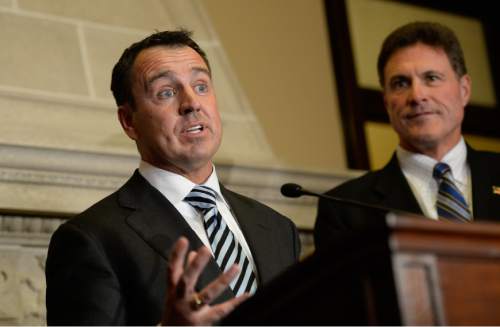This is an archived article that was published on sltrib.com in 2014, and information in the article may be outdated. It is provided only for personal research purposes and may not be reprinted.
Republican members of the Utah House spent a full day delving into the most pressing issues of the upcoming legislative session, including health insurance for the poor, paying for roads and schools and long-term budgeting.
The 63-member Republican House caucus, a supermajority in the body, did not stake out any formal positions after the all-day, closed-door meeting, but House Speaker-elect Greg Hughes said lawmakers came away with a fuller, deeper understanding of the issues they are facing.
"I believe we're resolved to tackle these weighty issues in the upcoming session," Hughes said. "I believe there is political will to do the heavy lifting."
One of the chief matters discussed was whether to back Gov. Gary Herbert's Healthy Utah plan to use federal Medicaid dollars to help 95,000 low-income Utahns buy health insurance.
Herbert has said that it would cost the state $4.6 million to administer the program for the first roughly 18 months, but would enable the state to recover $440 million in tax dollars collected under the Affordable Care Act, otherwise known as Obamacare.
Hughes said the House doesn't see it as a "yes-or-no question" of whether to support Herbert's plan, and there are experts in the field — doctors, insurance executives, health administrators — who are committed to finding the best solution.
"I think what we're looking at now, everyone sees and has a desire to do something to move in a way where we're covering people who aren't currently covered. To what degree that will be I can't say," Hughes said.
There is also a recognition among the caucus that, once in place, any benefits will be hard to take away and will likely be a long-term commitment for the state, so it is imperative to get it right.
The body also had an in-depth discussion of the gas tax and how to pay for road projects. The state's 24.5-cent gas tax hasn't increased since 1997. Herbert has said that it makes sense to increase the tax to recoup the lost buying power because proceeds haven't kept pace with inflation. It would take an increase of about 11 cents per gallon to catch up to inflation.
Hughes said the body discussed whether raising the gas tax was the solution, or if the entire structure for funding road projects needed to be revamped.
"You can just take [the current gas tax] and say let's raise it five cents or ten cents," Hughes said. "Does that fix your problem long-term? So we talked about the formula itself and what is the formula for funding long-term."
On education and budgeting, Hughes said the focus was on making sure that programs are sustainable, not just when the economy is growing, as it is now, but so lawmakers don't have to make deep cuts to programs when the economy slides into recession.
Legislative leaders, believing the economy might be growing too fast and creating a bubble, are looking at stashing away as much as $116 million in the upcoming session as a hedge against a potential future downturn.
The Senate Republican caucus is scheduled to hold its first of two full-day closed-door caucuses on Wednesday.
Twitter: @RobertGehrke



